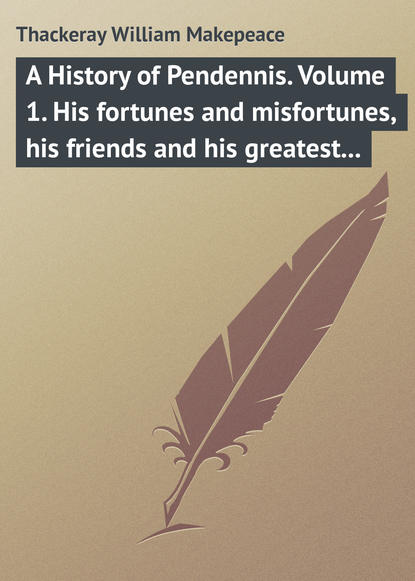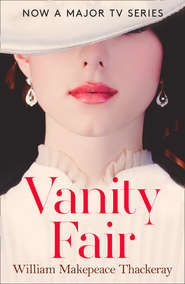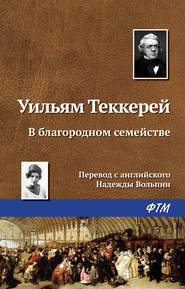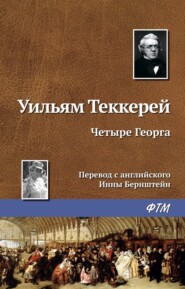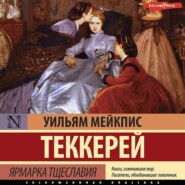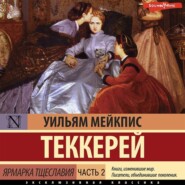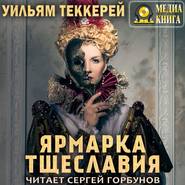По всем вопросам обращайтесь на: info@litportal.ru
(©) 2003-2024.
✖
A History of Pendennis. Volume 1. His fortunes and misfortunes, his friends and his greatest enemy
Настройки чтения
Размер шрифта
Высота строк
Поля
"Ah yes: the cup and merry jest went round. We chanted: and I remember I wanted to fight a post-boy. Did I thrash him, Stoopid?"
"No, sir. Fight didn't come off, sir," said Stoopid, still with perfect gravity. He was arranging Mr. Foker's dressing-case – a trunk, the gift of a fond mother, without which the young fellow never traveled. It contained a prodigious apparatus in plate; a silver dish, a silver mug, silver boxes and bottles for all sorts of essences, and a choice of razors ready against the time when Mr. Foker's beard should come.
"Do it some other day," said the young fellow, yawning and throwing up his little lean arms over his head. "No, there was no fight; but there was chanting. Bingley chanted, I chanted, the general chanted – Costigan I mean. – Did you ever hear him sing 'The Little Pig under the Bed,' Pen?"
"The man we met yesterday," said Pen, all in a tremor, "the father of – "
"Of the Fotheringay – the very man. Ain't she a Venus, Pen?"
"Please sir, Mr. Costigan's in the sittin-room, sir, and says, sir, you asked him to breakfast, sir. Called five times, sir; but wouldn't wake you on no account; and has been year since eleven o'clock, sir – "
"How much is it now?"
"One, sir."
"What would the best of mothers say," cried the little sluggard, "if she saw me in bed at this hour? She sent me down here with a grinder. She wants me to cultivate my neglected genus. – He he! I say, Pen, this isn't quite like seven o'clock school – is it, old boy?" – and the young fellow burst out into a boyish laugh of enjoyment. Then he added – "Go in and talk to the general whilst I dress. And I say, Pendennis, ask him to sing you 'The Little Pig under the Bed;' it's capital." Pen went off in great perturbation, to meet Mr. Costigan, and Mr. Foker commenced his toilet.
Of Mr. Foker's two grandfathers, the one from whom he inherited a fortune, was a brewer; the other was an earl, who endowed him with the most doting mother in the world. The Fokers had been at the Cistercian school, from father to son; at which place, our friend whose name could be seen over the play-ground wall, on a public-house sign, under which "Foker's Entire" was painted, had been dreadfully bullied on account of his trade, his uncomely countenance, his inaptitude for learning and cleanliness, his gluttony and other weak points. But those who know how a susceptible youth, under the tyranny of his schoolfellows becomes silent and a sneak, may understand how, in a very few months after his liberation from bondage, he developed himself as he had done; and became the humorous, the sarcastic, the brilliant Foker, with whom we have made acquaintance. A dunce he always was, it is true; for learning can not be acquired by leaving school and entering at college as a fellow commoner; but he was now (in his own peculiar manner) as great a dandy as he before had been a slattern, and when he entered his sitting-room to join his two guests, arrived scented and arrayed in fine linen, and perfectly splendid in appearance.
General or Captain Costigan – for the latter was the rank which he preferred to assume – was seated in the window with the newspaper held before him at arm's length. The captain's eyes were somewhat dim; and he was spelling the paper with the help of his lips as well as of those blood-shot eyes of his, as you see gentlemen do to whom reading is a rare and difficult occupation. His hat was cocked very much on one ear; and as one of his feet lay up in the window-seat, the observer of such matters might remark, by the size and shabbiness of the boots which the captain wore that times did not go very well with him. Poverty seems as if it were disposed, before it takes possession of a man entirely, to attack his extremities first: the coverings of his head, feet, and hands, are its first prey. All these parts of the captain's person were particularly rakish and shabby. As soon as he saw Pen he descended from the window-seat and saluted the new comer, first in a military manner, by conveying a couple of his fingers (covered with a broken black glove) to his hat, and then removing that ornament altogether. The captain was inclined to be bald, but he brought a quantity of lank iron-gray hair over his pate, and had a couple of wisps of the same falling down on each side of his face. Much whisky had spoiled what complexion Mr. Costigan may have possessed in his youth. His once handsome face had now a copper tinge. He wore a very high stock, scarred and stained in many places; and a dress-coat tightly buttoned up in those parts where the buttons had not parted company from the garment.
"The young gentleman to whom I had the honor to be introjuiced yesterday in the Cathadral Yard," said the captain, with a splendid bow and wave of his hat. "I hope I see you well, sir. I marked ye in the thayater last night during me daughter's perfawrumance; and missed ye on my return. I did but conduct her home, sir, for Jack Costigan, though poor, is a gentleman; and when I reintered the house to pay me respects to me joyous young friend Mr. Foker – ye were gone. We had a jolly night of ut, sir – Mr. Foker, the three gallant young dragoons, and your 'umble servant. Gad, sir, it put me in mind of one of our old nights when I bore His Majesty's commission in the Foighting Hundtherd and Third." And he pulled out an old snuff-box, which he presented with a stately air to his new acquaintance.
Arthur was a great deal too much flurried to speak. This shabby-looking buck was – was her father. The captain was perfumed with the recollections of the last night's cigars, and pulled and twisted the tuft on his chin as jauntily as any young dandy.
"I hope, Miss F – , Miss Costigan is well sir," Pen said, flushing up. "She – she gave me greater pleasure, than – than I – I – I ever enjoyed at a play. I think, sir – I think she's the finest actress in the world," he gasped out.
"Your hand, young man! for ye speak from your heart," cried the captain. "Thank ye, sir, an old soldier and a fond father thanks ye. She is the finest actress in the world. I've seen the Siddons, sir, and the O'Nale. – They were great, but what were they compared to Miss Fotheringay? I do not wish that she should ashume her own name while on the stage. Me family, sir, are proud people; and the Costigans of Costiganstown think that an honest man who has borne Her Majesty's colors in the Hundred and Third, would demean himself, by permitting his daughter to earn her old father's bread."
"There can not be a more honorable duty, surely," Pen said.
"Honorable! Bedad, sir, I'd like to see the man who said Jack Costigan would consent to any thing dishonorable. I have a heart, sir, though I am poor; I like a man who has a heart. You have; I read it in your honest face and steady eye. And would you believe it?" he added, after a pause, and with a pathetic whisper, "that that Bingley, who has made his fortune by me child, gives her but two guineas a week, out of which she finds herself in dresses, and which, added to me own small means makes our all?"
Now the captain's means were so small as to be, it may be said, quite invisible. But nobody knows how the wind is tempered to shorn Irish lambs, and in what marvelous places they find pasture. If Captain Costigan, whom I had the honor to know, would but have told his history, it would have been a great moral story. But he neither would have told it if he could, nor could if he would; for the captain was not only unaccustomed to tell the truth – he was unable even to think it – and fact and fiction reeled together in his muzzy, whiskified brain.
He began life rather brilliantly with a pair of colors, a fine person and legs, and one of the most beautiful voices in the world. To his latest day he sang, with admirable pathos and humor, those wonderful Irish ballads which are so mirthful and so melancholy: and was always the first himself to cry at their pathos. Poor Cos! he was at once brave and maudlin, humorous and an idiot; always good-natured, and sometimes almost trustworthy. Up to the last day of his life he would drink with any man, and back any man's bill: and his end was in a spunging-house, where the sheriff's officer who took him, was fond of him.
In his brief morning of life, Cos formed the delight of regimental messes, and had the honor of singing his songs, bacchanalian and sentimental, at the tables of the most illustrious generals and commanders-in-chief, in the course of which period he drank three times as much claret as was good for him, and spent his doubtful patrimony. What became of him subsequently to his retirement from the army, is no affair of ours. I take it, no foreigner understands the life of an Irish gentleman without money, the way in which he manages to keep afloat – the wind-raising conspiracies, in which he engages with heroes as unfortunate as himself – the means by which he contrives, during most days of the week, to get his portion of whisky-and-water: all these are mysteries to us inconceivable: but suffice it to say, that through all the storms of life Jack had floated somehow, and the lamp of his nose had never gone out.
Before he and Pen had had a half hour's conversation, the captain managed to extract a couple of sovereigns from the young gentleman for tickets for his daughter's benefit, which was to take place speedily, and was not a bonâ fide transaction such as that of the last year, when poor Miss Fotheringay had lost fifteen shillings by her venture, but was an arrangement with the manager, by which the lady was to have the sale of a certain number of tickets, keeping for herself a large portion of the sum for which they were sold.
Pen had but two pounds in his purse, and he handed them over to the captain for the tickets; he would have been afraid to offer more, lest he should offend the latter's delicacy. Costigan scrawled him an order for a box, lightly slipped the sovereigns into his waistcoat, and slapped his hand over the place where they lay. They seemed to warm his old sides.
"Faith, sir," said he, "the bullion's scarcer with me than it used to be, as is the case with many a good fellow. I won six hundthred of 'em in a single night, sir, when me kind friend, His Royal Highness the Duke of Kent, was in Gibralther." And he straightway poured out to Pen a series of stories regarding the claret drunk, the bets made, the races ridden by the garrison there, with which he kept the young gentleman amused until the arrival of their host and his breakfast.
Then it was good to see the captain's behavior before the deviled turkey and the mutton-chops! His stories poured forth unceasingly, and his spirits rose as he chatted to the young men. When he got a bit of sunshine, the old lazarone basked in it; he prated about his own affairs and past splendor, and all the lords, generals, and lord-lieutenants he had ever known. He described the death of his darling Bessie, the late Mrs. Costigan, and the challenge he had sent to Captain Shanty Clancy, of the Slashers, for looking rude at Miss Fotheringay as she was on her kyar in the Phaynix; and then he described how the captain apologized, gave a dinner at the Kildare-street, where six of them drank twinty-one bottles of claret, &c. He announced that to sit with two such noble and generous young fellows was the happiness and pride of an old soldier's existence; and having had a second glass of Curaçoa, was so happy that he began to cry. Altogether we should say that the captain was not a man of much strength of mind, or a very eligible companion for youth; but there are worse men, holding much better places in life, and more dishonest, who have never committed half so many rogueries as he. They walked out, the captain holding an arm of each of his dear young friends, and in a maudlin state of contentment. He winked at one or two tradesmen's shops, where, possibly, he owed a bill, as much as to say – "See the company I am in – sure I'll pay you, my boy" – and they parted finally with Mr. Foker at a billiard-room, where the latter had a particular engagement with some gentlemen of Colonel Swallowtail's regiment.
Pen and the shabby captain still walked the streets together; the captain, in his sly way, making inquiries about Mr. Foker's fortune and station in life. Pen told him how Foker's father was a celebrated brewer, and his mother was Lady Agnes Milton, Lord Rosherville's daughter. The captain broke out into a strain of exaggerated compliment and panegyric about Mr. Foker, whose "native aristocracie," he said, "could be seen with the twinkling of an oi – and only served to adawrun other qualities which he possessed – a foin intellect and a generous heart" – in not one word of which speech did the captain accurately believe.
Pen walked on, listening to his companion's prate, wondering, amused, and puzzled. It had not as yet entered into the boy's head to disbelieve any statement that was made to him; and being of a candid nature himself, he took naturally for truth what other people told him. Costigan had never had a better listener, and was highly flattered by the attentiveness and modest bearing of the young man.
So much pleased was he with the young gentleman, so artless, honest, and cheerful did Pen seem to be, that the captain finally made him an invitation, which he very seldom accorded to young men, and asked Pen if he would do him the fevor to enter his humble abode, which was near at hand, where the captain would have the honor of inthrojuicing his young friend to his daughther, Miss Fotheringay?
Pen was so delightfully shocked at this invitation, and was so stricken down by the happiness thus suddenly offered to him, that he thought he should have dropped from the captain's arm at first, and trembled lest the other should discover his emotion. He gasped out a few incoherent words, indicative of the high gratification he should have in being presented to the lady for whose – for whose talents he had conceived such an admiration – such an extreme admiration, and followed the captain, scarcely knowing whither that gentleman led him. He was going to see her! He was going to see her! In her was the center of the universe. She was the kernel of the world for Pen. Yesterday, before he knew her, seemed a period ever so long ago – a revolution was between him and that time, and a new world about to begin.
The captain conducted his young friend to that quiet little street in Chatteries, which is called Prior's Lane, which lies in the ecclesiastical quarter of the town, close by Dean's Green and the canons' houses, and is overlooked by the enormous towers of the cathedral; there the captain dwelt modestly in the first floor of a low gabled house, on the door of which was the brass-plate of "Creed, Tailor and Robe-maker." Creed was dead, however. His widow was a pew-opener in the cathedral hard by; his eldest son was a little scamp of a choir-boy, who played toss-halfpenny, led his little brothers into mischief, and had a voice as sweet as an angel. A couple of the latter were sitting on the door-step, down which you went into the passage of the house; and they jumped up with great alacrity to meet their lodger, and plunged wildly, and rather to Pen's surprise, at the swallow-tails of the captain's dress-coat; for the truth is, that the good-natured gentleman, when he was in cash, generally brought home an apple or a piece of gingerbread for these children – "Whereby the widdy never pressed me for rint when not convanient," as he remarked afterward to Pen, winking knowingly, and laying a finger on his nose.
Pen tumbled down the step, and as he followed his companion up the creaking old stair, his knees trembled under him. He could hardly see when he entered, following the captain, and stood in the room – in her room. He saw something black before him, and waving as if making a courtesy, and heard, but quite indistinctly, Costigan making a speech over him, in which the captain, with his usual magniloquence, expressed to "me child" his wish to make her known to "his dear and admirable young friend, Mr. Awther Pindinnis, a young gentleman of property in the neighborhood, a person of refoined moind, and emiable manners, a sincare lover of poethry, and a man possest of a feeling and affectionate heart."
"It is very fine weather," Miss Fotheringay said, in an Irish accent, and with a deep, rich, melancholy voice.
"Very," said Mr. Pendennis. In this romantic way their conversation began, and he found himself seated on a chair, and having leisure to look at the young lady.
She looked still handsomer off the stage than before the lamps. All her attitudes were naturally grand and majestical. If she went and stood up against the mantle-piece her robe draped itself classically round her; her chin supported itself on her hand, the other lines of her form arranged themselves in full harmonious undulations: she looked like a muse in contemplation. If she sate down on a cane-bottomed chair, her arm rounded itself over the back of the seat, her hand seemed as if it ought to have a scepter put into it, the folds of her dress fell naturally round her in order, like ladies of honor round a throne, and she looked like an empress. All her movements were graceful and imperial. In the morning you could see her hair was blue-black, her complexion of dazzling fairness, with the faintest possible blush flickering, as it were, in her cheek. Her eyes were gray, with prodigious long lashes; and as for her mouth, Mr. Pendennis has given me subsequently to understand, that it was of a staring red color, with which the most brilliant geranium, sealing-wax, or guardsman's coat, could not vie.
"And very warm," continued this empress and Queen of Sheba.
Mr. Pen again assented, and the conversation rolled on in this manner. She asked Costigan whether he had had a pleasant evening at the George, and he recounted the supper and the tumblers of punch. Then the father asked her how she had been employing the morning.
"Bows came," said she, "at ten, and we studied Ophalia. It's for the twenty-fourth, when I hope, sir, we shall have the honor of seeing ye."
"Indeed, indeed, you will," Mr. Pendennis cried, wondering that she should say "Ophalia," and speak with an Irish inflection of voice naturally, who had not the least Hibernian accent on the stage.
"I've secured 'um for your benefit, dear," said the captain, tapping his waistcoat pocket, wherein lay Pen's sovereigns, and winking at Pen with one eye, at which the boy blushed.
"Mr. – the gentleman's very obleging," said Mrs. Haller.
"My name is Pendennis," said Pen, blushing. "I – I – hope you'll – you'll remember it." His heart thumped so as he made this audacious declaration, that he almost choked in uttering it.
"Pendennis," she answered slowly, and looking him full in the eyes, with a glance so straight, so clear, so bright, so killing, with a voice so sweet, so round, so low, that the word and the glance shot Pen through and through, and perfectly transfixed him with pleasure.
"I never knew the name was so pretty before," Pen said.
"'Tis a very pretty name," Ophelia said. "Pentweazle's not a pretty name. Remember, papa, when we were on the Norwich Circuit, Young Pentweazle, who used to play second old men, and married Miss Rancy, the Columbine; they're both engaged in London now, at the Queen's, and get five pounds a week. Pentweazle wasn't his real name. 'Twas Judkin gave it him, I don't know why. His name was Harrington; that is, his real name was Potts; fawther a clergyman, very respectable. Harrington was in London, and got in debt. Ye remember, he came out in Falkland, to Mrs. Bunce's Julia."
"And a pretty Julia she was," the captain interposed; "a woman of fifty, and a mother of ten children. 'Tis you ought to have been Julia, or my name's not Jack Costigan."
"I didn't take the leading business then," Miss Fotheringay said, modestly; "I wasn't fit for't till Bows taught me."
"True for you, my dear," said the captain: and bending to Pendennis, he added, "Rejuced in circumstances, sir, I was for some time a fencing master in Dublin (there's only three men in the empire could touch me with the foil once, but Jack Costigan's getting old and stiff now, sir); and my daughter had an engagement at the thayater there; and 'twas there that my friend, Mr. Bows, who saw her capabilities, and is an uncommon 'cute man, gave her lessons in the dramatic art, and made her what ye see. What have ye done since Bows went, Emily?"
"Sure, I've made a pie," Emily said, with perfect simplicity. She, pronounced it "poy."
"If ye'll try it at four o'clock, sir, say the word," said Costigan, gallantly. "That girl, sir, makes the best veal and ham pie in England, and I think I can promise ye a glass of punch of the right flavor."
Pen had promised to be at home to dinner at six o'clock, but the rascal thought he could accommodate pleasure and duty in this point, and was only too eager to accept this invitation. He looked on with delight and wonder while Ophelia busied herself about the room, and prepared for the dinner. She arranged the glasses, and laid and smoothed the little cloth, all which duties she performed with a quiet grace and good humor, which enchanted her guest more and more. The "poy" arrived from the baker's, in the hands of one of the little choir-boy's brothers, at the proper hour: and at four o'clock, Pen found himself at dinner – actually at dinner with the greatest tragic actress in the world, and her father – with the handsomest woman in all creation – with his first and only love, whom he had adored ever since when? – ever since yesterday, ever since forever. He ate a crust of her making, he poured her out a glass of beer, he saw her drink a glass of punch – just one wine-glass full – out of the tumbler which she mixed for her papa. She was perfectly good-natured, and offered to mix one for Pendennis too. It was prodigiously strong; Pen had never in his life drunk so much spirits and water. Was it the punch, or the punch-maker who intoxicated him?
During dinner, when the captain, whom his daughter treated most respectfully, ceased prattling about himself and his adventures, Pen tried to engage the Fotheringay in conversation about poetry and about her profession. He asked her what she thought of Ophelia's madness, and whether she was in love with Hamlet or not? "In love with such a little ojous wretch as that stunted manager of a Bingley?" She bristled with indignation at the thought. Pen explained it was not of her he spoke, but of Ophelia of the play. "Oh, indeed; if no offense was meant, none was taken; but as for Bingley, indeed, she did not value him – not that glass of punch." Pen next tried her on Kotzebue. "Kotzebue? who was he?" – "The author of the play in which she had been performing so admirably." "She did not know that – the man's name at the beginning of the book was Thompson," she said. Pen laughed at her adorable simplicity. He told her of the melancholy fate of the author of the play, and how Sand had killed him. It was for the first time in her life that Miss Costigan had ever heard of Mr. Kotzebue's existence, but she looked as if she was very much interested, and her sympathy sufficed for honest Pen.





